Murphy says NJ Transit is 'largely fixed.' Here's what the numbers say on rider experience
- Oops!Something went wrong.Please try again later.
“Why is NJ Transit so bad and unreliable?”
That question was posed to Gov. Phil Murphy during a recent “Ask the Governor” show on WNYC radio.
The caller, a New Jersey resident and regular rider of the rails, said she regularly deals with delays and problems with old train equipment and expressed her frustration that the commuting problems have become so routine, they may never go away.
Murphy, who has regularly touted a turnaround in the operations of NJ Transit — going so far as calling the system one of the best in the country — was caught off guard by the question.
“I’m deflated to hear [her] experience, because the overall experience is dramatically better than it was six years ago,” Murphy said during the December 2023 show. “The general experience right now is dramatically in the right direction.”
The governor has repeated this message to other frustrated callers in recent months, particularly as his administration faces heat for a 15% fare increase proposed in July — the first in nine years — and 3% annual hikes after that. Murphy also proposed a corporate transit tax to provide needed state aid to the agency that will be negotiated through the budget season that ends June 30.
Story continues after photo gallery.
“We couldn’t ask for a fare increase early on because we didn’t deserve it,” the governor said on News12 in January. “We think this is a fair increase.”
But for those using NJ Transit on a regular basis — whether train, bus, light rail or Access Link services for seniors or those with disabilities — the commuting experience on NJ Transit does not feel as if it has substantially improved.
By nearly every metric of publicly available data, NorthJersey.com found that NJ Transit’s four modes of transportation performed the same in 2023 as in 2017 or worse. NorthJersey.com used 2017 for comparison because it was the year before Murphy took office and former Gov. Chris Christie’s last year in office.
Anthony Grieco, senior vice president of communications and customer experience at NJ Transit, argued that 2018 should be the baseline for measuring progress.
"It was the first year the Murphy administration came into office, and Kevin Corbett was appointed president and CEO — this is when the administration inherited a decimated transit agency that was grossly underfunded throughout the entire eight years of the Christie administration," Grieco said, adding that "the data yields quite the contrary — the improvements have been rather dramatic."
Numerous improvements
Under Murphy's watch, NJ Transit has indeed made numerous improvements and fixed several problems inherited from the Christie administration, including fully staffing the locomotive engineer ranks, which were depleted, and completing the installation and testing of positive train control. The federally mandated emergency braking system was only 12% installed when Christie left office.
NJ Transit has also added hundreds of bus trips to address increasing demand and developed a historic $6 billion capital program, up from just $60 million in contracts on the street in 2017.
NJ Transit was named the “most outstanding public transportation agency” last year by the American Public Transportation Association because of the improvements, and it received its highest-ever customer satisfaction rating, 6.8, since NJ Transit began surveying customers in 2011.
Waits 'have gotten longer'
But those improvements are not yet translating into improved experiences for some riders.
“Since the pandemic, wait times have gotten longer, often 30 minutes, sometimes even up to an hour,” said Avelino Nazario, a Passaic resident who rides the 709, 712 and 190 buses almost every day. He spoke at a recent public hearing the agency held to get feedback on the fare hike plan.
“You’re waiting for the bus, wet and cold on days like this, nervous that I’ll be late to work or desperate to use the bathroom, but you can’t leave in case the bus comes," Nazario said. "So I’m shocked to hear there’s a fare hike with no improvement on services.”
To understand the disconnect between Murphy’s message that he has “largely fixed” NJ Transit and some commuters’ repeated complaints about chronic service problems, NorthJersey.com analyzed three performance indicators: on-time performance, trip cancellations and mean distance between failure (MDBF), which is the metric used to show how many miles agency vehicles typically travel before breaking down.
Murphy signed an executive order in 2019 requiring NJ Transit to make rail performance metrics available to the public on its website, saying at the time, “We owe ourselves and the hundreds of thousands of commuters who rely on this system day in and day out a true accounting of NJ Transit performance.” The agency has also provided some additional performance data for bus, light rail and Access Link.
Here is a breakdown of NorthJersey.com’s findings by mode:
Train on-time rate and cancellations
NJ Transit’s trains arrived on time 91% of the time in 2023, the same as in 2017, but train cancellations increased to more than 3,500 in 2023, which was 7% higher than in 2017.
The number of train cancellations has, however, significantly improved from 2018, in Murphy's first year, when they peaked at 5,144. That year the locomotive engineering shortage was at its height, with 1,230 cancellations for that reason alone. In 2023, there was one train cancellation because a locomotive engineer wasn't available.
When it comes to NJ Transit’s train reliability, Murphy often points to the delay-prone 114-year-old Hudson River rail tunnel and the Northeast Corridor, the busiest set of railroad tracks in the country — both plagued by aging, salt-damaged wires and signals that are maintained by Amtrak but also cause delays for NJ Transit trains when they act up.
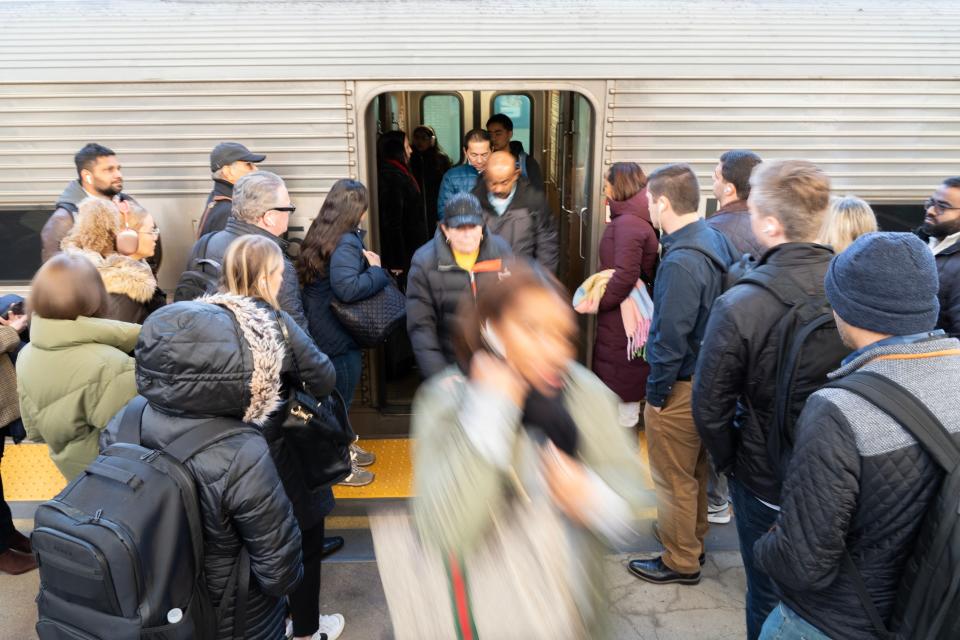
“The biggest challenge we have right now is that my predecessor canceled" a new new rail tunnel project under the Hudson River, Murphy told a viewer who called in to News12’s “Ask the Governor” segment. Murphy, in contrast, has helped get the Gateway project off the ground. It involves building a new two-track rail tunnel between North Jersey and Manhattan and then repairing the old tunnel, which was seriously damaged by Superstorm Sandy in 2012.
“That is far and away the biggest chokepoint, and it’s shameful that this wasn’t dealt with decades ago, but we’re finally dealing with it … we’re beholden to Amtrak issues,” Murphy said.
Amtrak-related issues do affect many NJ Transit trains. In February, its trains were on time 92.2% of the time, but that metric improved to 95.7% after the removal of trains that ran late because of Amtrak.
Story continues below video.
In 2023, 878 NJ Transit trains were canceled because of Amtrak issues. The last time that number was in the 800s was during the 2017 “Summer of Hell," when Amtrak scheduled eight weeks of emergency repair work after two minor derailments.
But the main reason for NJ Transit’s train cancellations for the last three years is mechanical failures. Last year, more than 1,100 trains didn’t complete trips because they broke down.
This, Grieco said, is also attributable to the prior administration, which failed to invest in new rail vehicles. Within his first year in office, the Murphy administration bought 113 new multi-level rail cars, which should begin arriving later this year and will "vastly reduce the average age of the fleet and significantly improve rail MDBF," Grieco said.
While many of NJ Transit’s trains are decades old and break down more frequently, the youngest members of its fleet have also declined in reliability. The multi-level railcars, which were put into service between 2012 and 2018, had a mean distance between failures of 967,471 miles in the third quarter of 2021. That decreased to a low of 378,052 miles in the second quarter of 2022 but improved to 577,214 miles in the third quarter last year, according to the most recently available data provided to the board last summer.
This fluctuation, said NJ Transit spokesman Jim Smith, "may be affected by supply chain issues that require cars to be out for longer periods of time awaiting parts."
Bus on-time performance has been rising
One of the only metrics that showed improvement in 2023 from 2017 was the on-time performance of NJ Transit’s bus operations, which rose to 92.3% in 2023, up from 90.3% in 2017.
Though down slightly from 2022, when it was 94.7%, it’s still a significant improvement given that NJ Transit added hundreds of new bus trips in 2023 and added or modified seven new routes to absorb the voids left by Coach and A&C, two private companies that dropped routes in Newark and Jersey City last year.
Ridership on those routes is booming since NJ Transit took over, in large part because of the increased reliability and on-time performance.
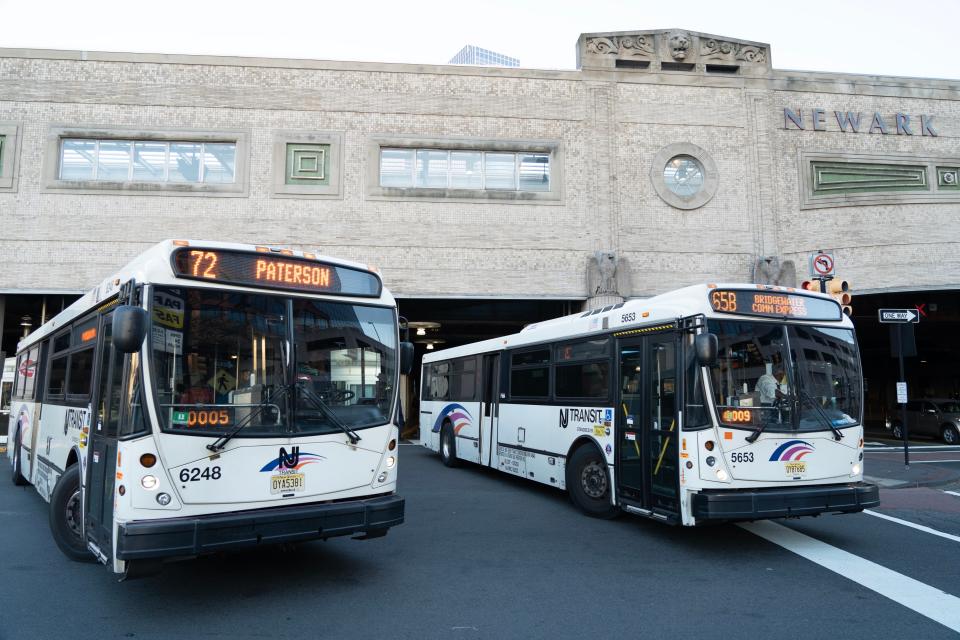
But one of the issues preventing NJ Transit’s bus operations from improving even more is the shortage of drivers.
In the first few years of Murphy’s administration, the agency went on a hiring spree to refill the ranks of bus drivers diminished during the prior administration. But this effort was upended during the COVID-19 pandemic, when industries that rely on commercially licensed drivers — or CDL holders — began scrambling to fill driving rosters as the demand for delivery services increased.
NJ Transit used a variety of creative tactics to lure CDL holders by advertising its competitive salary and benefits, streamlining the human resources process and offering signing bonuses, hiring more than 2,300 new bus operators since 2018. But the signing bonuses are now on the chopping block to save the agency about $1 million annually, one of many internal budget cuts to help the agency prepare for upcoming operating deficits.
Asked why that was among the cuts, Corbett, the president and CEO, said, “We’re in a good number for operators … but if we see that slipping then we’d have to look to reinstate that bonus.”
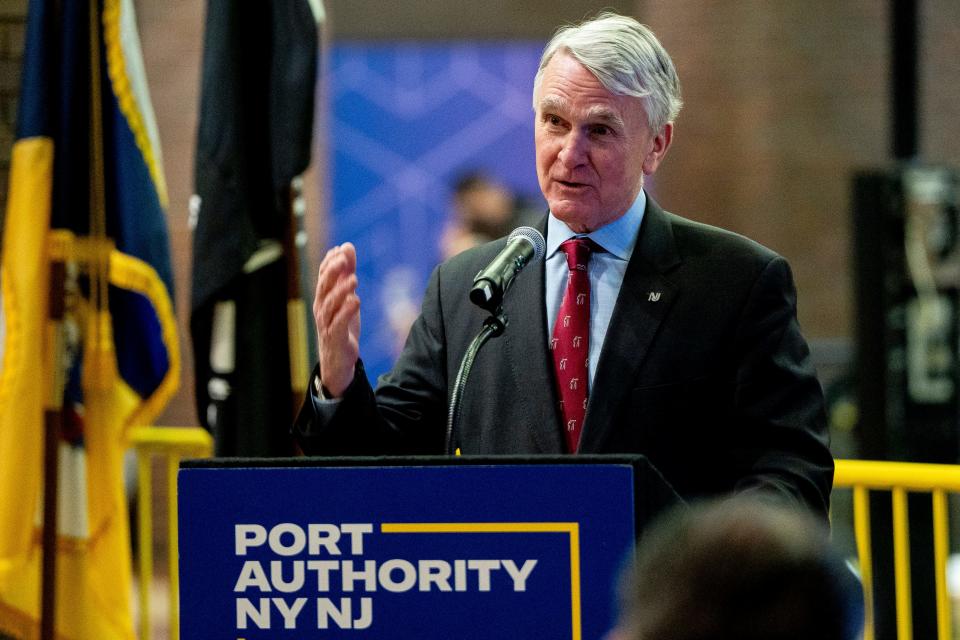
But bus operator availability is frequently cited as a reason for canceled bus trips.
NJ Transit does not make bus cancellation data available to the public or its board — even though it now tracks that metric for private carriers using GPS technology — but agency employees update its branded X feeds to announce bus cancellations. During one recent week (March 11-18), 181 bus cancellations were announced on X, and the reason for 90% of those was that there wasn’t a bus driver available. There are more than 15,000 bus trips on any given weekday.
Story continues below chart.
Light rail service on time 95.5% of the time
In 2023, 95.49% of trains across NJ Transit's three light rail lines were on time, down slightly from 96.8% in 2017, but still an "enviable statistic by any public transit standard," Grieco said.
NJ Transit operates the Newark Light Rail line but relies on private companies to maintain and operate the River Line in Trenton and the Hudson-Bergen Light Rail in Hudson County.
The Hudson-Bergen and River lines had the biggest dips in miles before needing repairs. In 2017, Hudson-Bergen trains ran for about 25,000 miles before the light rail vehicles broke down, and that declined in 2023 to 13,350 miles.
The River Line has experienced more ups and downs over the years but is slightly improved from 2017.
In 2017, River Line light rail trains ran about 8,900 miles before breaking down. That improved to more than 22,000 miles in 2022, after the 18-year-old diesel-powered cars received new, cleaner engines.
But the miles plummeted in 2023 to about 10,000, after problems with engines, heating, ventilation and air conditioning emerged last summer, forcing the agency to curtail service for about eight weeks between August and October.
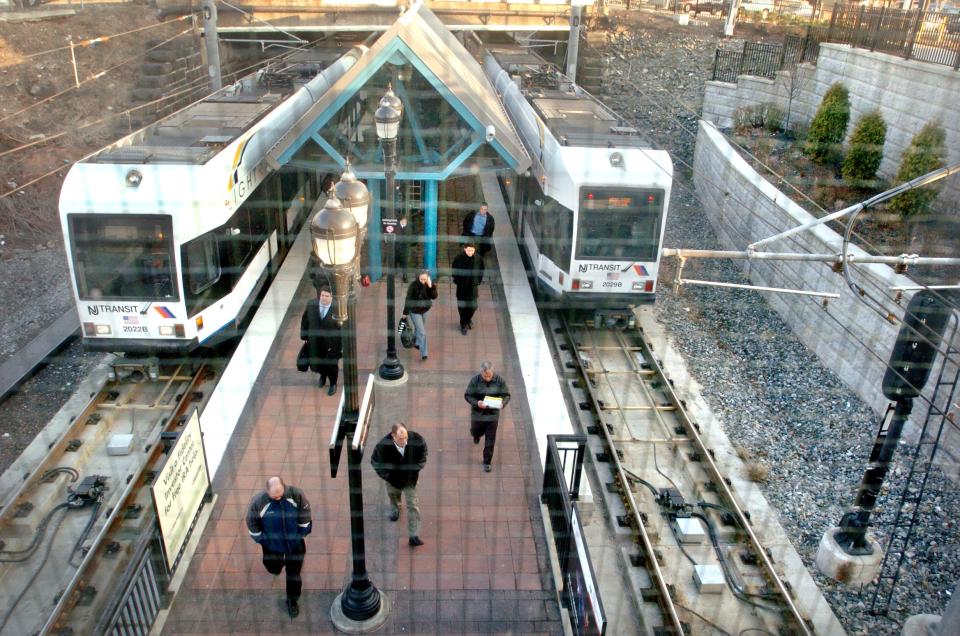
There had been 89 cancellations on the River Line so far this month through March 18, about three times as many as there were from March 1 to 18 in 2023, according to cancellations posted about on NJ Transit's branded X accounts. Most of those cancellations were because of mechanical problems or lack of equipment availability that could have stemmed from trains undergoing repairs.
The Newark Light Rail line led the three lines in train cancellations, based on a review of X postings. There were 157 cancellations from March 1 to 18, up from just 15 posted about during the same 18-day period in March 2023. All but 11 of the 157 cancellations so far in March 2024 were due to “operator availability,” a reason frequently cited for cancellations since December 2023, which Smith said is because "a higher number of operators than usual [are] out concurrently with medical issues." In March 2023, none of the 15 cancellations were because of operator availability.
Despite the recent cancellations from operators being unavailable, Newark Light Rail's on-time performance in February was 98%.
Grieco criticized the use of analyzing X posts from a few weeks in one month, saying it's "methodologically flawed and is not reflective of performance over the course of an entire year." But light rail cancellation numbers are not publicly provided to the public or board members; when asked if NJ Transit could provide that data, it did not.
Story continues below chart.
Access Link on-time numbers still lag
On-time performance is the only performance metric NJ Transit provides about Access Link, the van service it provides for seniors and people with disabilities.
In 2023, Access Link service arrived on time 87.5% of the time, up slightly from last year, when it was 85.2%, but down from 2017, when it was 92.5%.
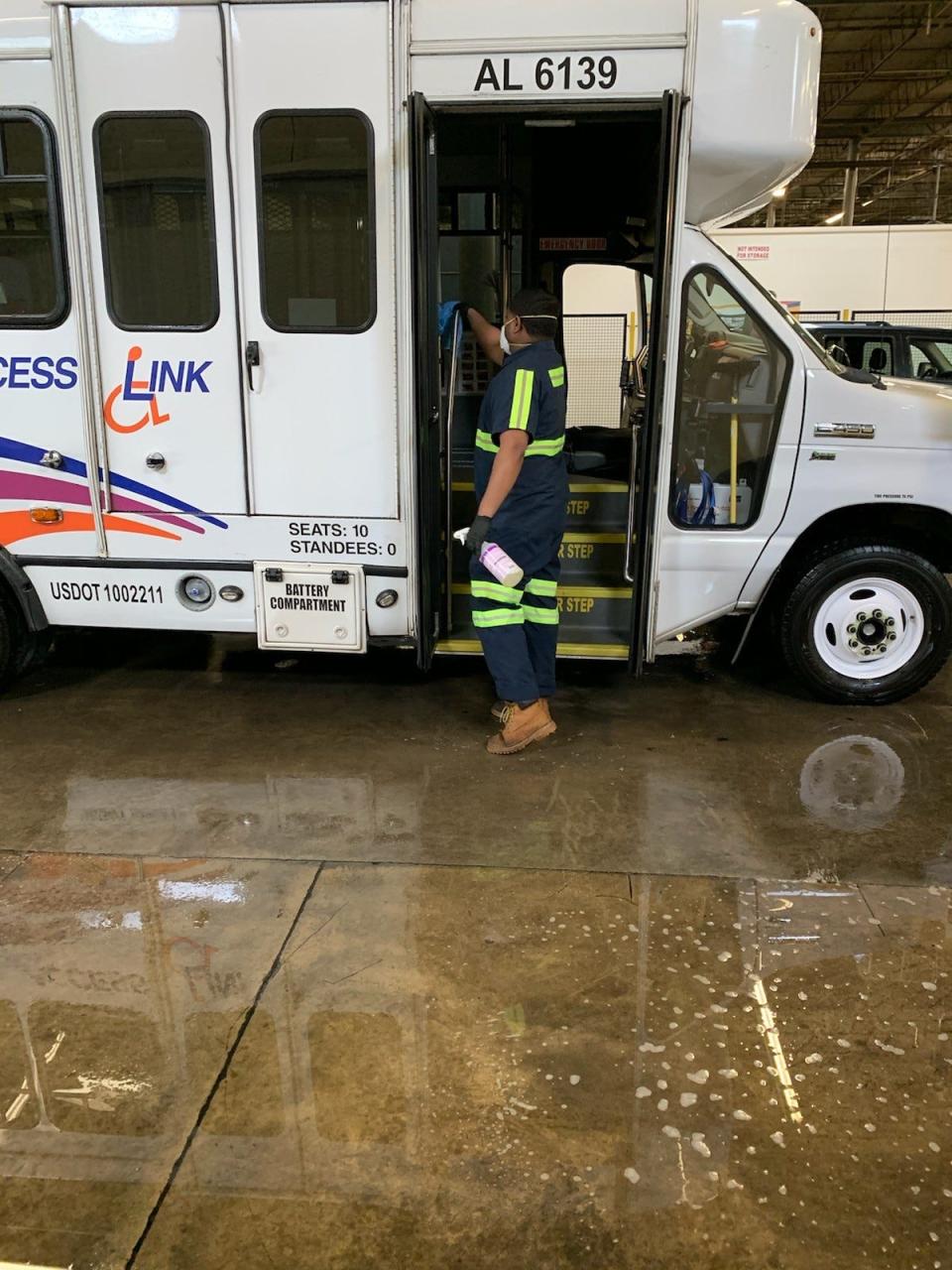
Lackluster on-time performance is a frequent complaint from customers who rely on this service to get to doctor’s appointments or hard-to-get jobs for those who have disabilities or rely on a wheelchair and have no other transportation options.
This was among the issues NJ Transit was supposed to resolve, according to two lawsuits NJ Transit settled in 2022 with the U.S. Attorney’s Office, which had reviewed Access Link service for a month and found that 13% of pickups were late and about 40% of drop-offs were late.
An additional requirement of the settlement is for at least 94% of all pickups to be within the pickup window, and Access Link has exceeded that so far this year, at 94.2% in January and 95.8% in February.
A hugely successful pilot program is helping the agency improve its performance. The pilot, which was expanded last month, partners NJ Transit with ride-hail or taxi organizations to provide Access Link services to those who don’t require a wheelchair lift. That should, theoretically, free up vans and staff for those who still rely on traditional Access Link vans.
This article originally appeared on NorthJersey.com: We looked at the numbers on NJ Transit rider experience

